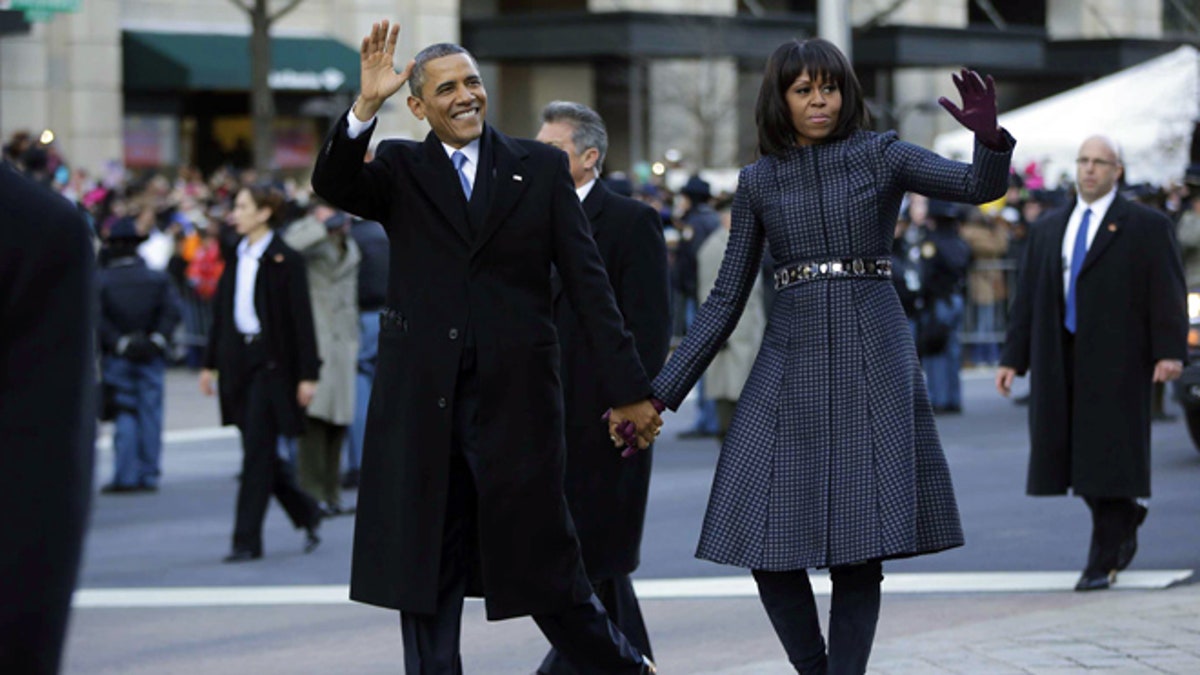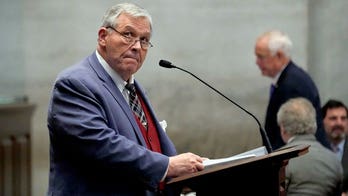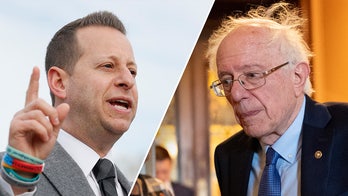
Jan. 21, 2013: President Obama and first lady Michelle Obama walk down Pennsylvania Avenue during the 57th Presidential Inauguration parade in Washington. (AP)
With the oath, a punchy inaugural address and the traditional ride down Pennsylvania Avenue, President Obama began his second term Monday pledging to "finish what we started."
But the president's success, and ultimately his legacy, will depend now on whether he can shake the stalemate in Washington.
In the final four years, Obama faces a stack of unfinished business that only grew as he focused his political energy on winning re-election. The president's personal agenda includes immigration reform, a new wave of gun control proposals and some action on climate change. He also will be drawn into a renewed round of debate over the nation's finances -- deadlines pertaining to the debt ceiling, the budget and the triggering of automatic spending cuts all loom in a matter of weeks.
How much gets done, though, depends on both sides burying the campaign battle ax.
Obama's address Monday offered mixed messages to that end. He urged the country to work together toward addressing the country's biggest challenges, saying "we are made for this moment, and we will seize it -- so long as we seize it together."
At the same time, he ripped what he described as "absolutism" and "name-calling" -- presumably among the Republicans -- and offered little in the way of an olive branch on the biggest issue that has divided Washington. On the debt debate, Obama used some of his most forceful language to defend costly entitlement programs, like Medicare, Medicaid and Social Security, which could be the target of cuts in upcoming fiscal talks.
He described those programs as a vital safety net -- though, without some intervention, budget forecasters warn they will not be sustainable at current levels in the long-term.
"We must make the hard choices to reduce the cost of health care and the size of our deficit. But we reject the belief that America must choose between caring for the generation that built this country and investing in the generation that will build its future," Obama said. "The commitments we make to each other -- through Medicare, and Medicaid and Social Security -- these things do not sap our initiative; they strengthen us. They do not make us a nation of takers; they free us to take the risks that make this country great."
Over the course of the speech, the president appeared to offer a series of assurances to his supporters that he would continue to fight for the issues he campaigned on.
For the time being, Republican congressional leaders muted any discontent they might have had with the speech.
"The president's second term represents a fresh start when it comes to dealing with the great challenges of our day; particularly, the transcendent challenge of unsustainable federal spending and debt," Senate Republican Leader Mitch McConnell said in a written statement.
Rank-and-file Republicans were less restrained.
Rep. Robert Pittenger, R-N.C., said the address that started "of the people, by the people and for the people" ended up being "of the government, by the government and for the government."
Rep. John Campbell, R-Calif., said the address was more controversial than the president's 2009 speech.
The president would appear to have two options for breaking the D.C. deadlock. Either he uses the bully pulpit to pressure Republicans or the back channels to negotiate.
For the near term, he seems to be going the former route. He already said when announcing his call for a new and stronger assault weapons ban that he wants to enlist the American people in calling for change. "The only way we can change is if the American people demand it," Obama said last week.
His longtime political advisers are also forming a new group to promote the president's second-term policy agenda.
It's unclear whether that approach will work. After battering Republicans in the final days of 2012, the Obama administration crafted a last-minute deal to avert the fiscal crisis. But that deal put off big decisions -- on entitlements, on tax reform. In the first year of Obama's second term, it should be clear whether Washington will start to make those decisions, or continue to punt.
House Republicans are now floating a three-month extension of the debt ceiling. But even if that passes, they'll have to come to a broader agreement three months later. And by March, lawmakers will have to decide whether and how they will shuffle around automatic spending cuts baked into the law in 2011 -- those cuts disproportionately affect the military.
Looming over all that is the challenge of striking what Obama once referred to as the "grand bargain," or a budget deal that would significantly reduce the deficit by $4 trillion or more over the next decade. Obama and House Speaker John Boehner have twice tried to reach such an agreement, and twice those talks fell apart.




